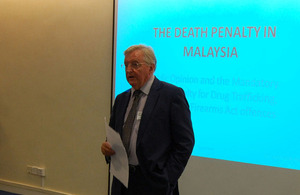Presentation by Roger Hood, Professor Emeritus of Criminology on the Death Penalty
Roger Hood, Professor Emeritus of Criminology at the University of Oxford talked about his new report on The Death Penalty in Malaysia.

Talk by Professor Roger Hood on "The Death Penalty in Malaysia: Public Opinion on the Mandatory Death Penalty for Drug Trafficking, Murder and Firearms Offences”
On 9 July 2013, Roger Hood, Professor Emeritus of Criminology at the University of Oxford, gave a presentation on his new report on the complexities of public attitudes towards the death penalty in Malaysia. The title of the report is “The Death Penalty in Malaysia: Public Opinion on the Mandatory Death Penalty for Drug Trafficking, Murder and Firearms Offences”.
Professor Hood is the former Director of the Oxford Centre for Criminology, a former consultant to the United Nations and the author of The Death Penalty: a Worldwide Perspective. He is a member of the Foreign Secretary’s Death Penalty Expert Group.
The report was commissioned by the Death Penalty Project in association with the Bar Council of Malaysia and completed by Ipsos Malaysia. The report showed that whilst on the surface support for the mandatory death penalty in Malaysia appears to be high, when reviewing actual criminal scenarios very few people wish to see the death penalty always used as the punishment for those convicted of capital offences.
Moreover, the survey suggested that few Malaysians would be particularly opposed to the complete abolition of the death penalty for drug and firearms offences and that few Malaysians thought that the death penalty was one of the most important ways to tackle crime.
Following the presentation there was time for some brief questions from the audience, which comprised lawyers and others with an interest in the subject, including from the Association of Criminal Lawyers and the NUS Criminal Justice Club. Professor Hood explained that it was impossible to establish if the death penalty has been an effective means of deterring crime.
Some countries which have the death penalty have very high rates of crime whilst others, such as Hong Kong, have seen crime rates fall after abolishing the death penalty. Even if it might hypothetically discourage some people from committing crimes, the death penalty may encourage other criminals to commit more desperate and heinous offences (eg. more likely to kill witnesses or smuggle more drugs if they know they already face the death penalty).
There was also a debate about the victims of crime and their families, that whilst some victims wish to see offenders executed others victims do not.